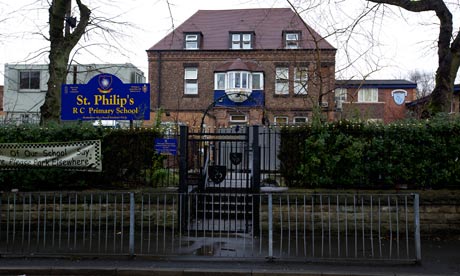The
Education System in England
|
|
Supervised
by
|
Department for Education.
Department for Business, Innovations and skills.
Local Education Authority. |
Education
stages
|
Ages
|
Nursery
|
3-4 years old
|
Primary education
-
Infant school
-
Junior school
|
5-11 years old
5-7 years old
7-11 years old
|
Secondary education
|
11-18 years old
|
Tertiary education
|
18+ years old
|
The
Education System in Chile
|
|
Regulated
and monitored by
|
Organic Law for Education (LOCE) before LGE.
Ministry of Education (MINEDUC). |
Education
stages
|
Ages
|
Kindergarten (“Kinder”)
|
5-6 years old
|
Primary education (“Básica”)
|
6-13 years old
|
Secondary education (“Media”)
|
13-18 years old
|
Higher education (“Superior”)
|
17-18+ years old
|
English
people are demanded by law to have an education until they are 16 years old¹.
Full-time education is compulsory for all children, but school is not because
they are not required to attend it.
It is
also demanded by law to have an education for all Chilean people until they are
18 years old. The pre-primary level is not necessary to be studied the first
two or three years, but primary and secondary are compulsory.
*¹ This will be raised, in 2013, to the year in which they turn 17 and, in
2015, to their 18th birthday.
The School Year
The England school year runs from September 1st
to July (39 weeks long). Some counties in England still follow the
traditional three terms a year, which is divided in:
- Autumn Term: 1st week of September to 3rd week in December
- Spring Term: 1st or 2nd week of January to Easter (April)
- Summer Term: 2 weeks after Easter
to the end of July
There
are many other areas in which the year is divided into six terms: September
to October, October
to December, January
to February, February
to March, April
to May and June to
July.
These are the main standard
holidays during the school year:
- Christmas: Two weeks
- Easter (Spring): Two weeks
- Summer: Five - Six weeks
There are also one week
holidays at the end of October, mid February and the last week of May. In general, the dates for school
terms and holidays are given by the local authorithy or the governing body of a
school, or by the school itself (independent schools).
In Chile, the year runs from the first week of March to the second week
of December. The year is divided in two terms. The first term is from March to
the second week of July, then pupils have two weeks of holidays and they enter
school on August for the second term. There are two months and a half for
summer holidays after they finish the academic year.
School Categories
In England, education can be provided by state or
independent schools, as well as homeschooling system:
Free education from public funds |
94% of pupils |
Independent fee paying schools or homeschooling |
6% of pupils |
There are three kinds of schools in Chile:
State-subsidized or “municipal” |
64% of pupils |
Private with a government subsidy or “particular subvencionado” |
29% of pupils |
Private |
7% of pupils |
 In England,
state-run schools are financed through national taxation and take pupils free
of charge between the ages 3 to 18, as well as Chilean state-subsidized
schools. Both Education systems are beneficiated with extra activities such as sports, theatre visits, cultural trips and swimming (only england) for free.
In England,
state-run schools are financed through national taxation and take pupils free
of charge between the ages 3 to 18, as well as Chilean state-subsidized
schools. Both Education systems are beneficiated with extra activities such as sports, theatre visits, cultural trips and swimming (only england) for free.
A significant minority of
state-funded schools are faith schools, which are
attached to religious groups, most often the Church of England or the Roman
Catholic Church. But most of religious schools in Chile belong to the Private
with a government subsidy and Private categories.
Pupils normally take GCSE exams in the last two years of Key Stage 4, but may also choose to work towards the attainment of alternative qualifications, such as the GNVQ. This way, they can get their academic certification.
Higher education often begins with a three-year bachelor's degree. Postgraduate degrees include master's degrees, either taught or by research. Also the doctorate, a research degree that usually takes at least three years. Universities require a Royal Charter in order to issue degrees, and all but one are financed by the state via tuition fees.
Pupils normally take GCSE exams in the last two years of Key Stage 4, but may also choose to work towards the attainment of alternative qualifications, such as the GNVQ. This way, they can get their academic certification.
Higher education often begins with a three-year bachelor's degree. Postgraduate degrees include master's degrees, either taught or by research. Also the doctorate, a research degree that usually takes at least three years. Universities require a Royal Charter in order to issue degrees, and all but one are financed by the state via tuition fees.
 In Chile,
after graduation from high school, students must take the national exam “Prueba
Selección Universitaria” (P.S.U), so they may enter college. Some students opt
to enter a pre-university program to prepare for this exam during the last two
years of high school.
In Chile,
after graduation from high school, students must take the national exam “Prueba
Selección Universitaria” (P.S.U), so they may enter college. Some students opt
to enter a pre-university program to prepare for this exam during the last two
years of high school. There are some others who choose to study in private universities or at a professional institute or technical center (may have additional entrance examinations).
In higher education, students are divided by faculty
and then by year. University students study for four to seven years; those
studying for four or five years usually get a bachelor’s degree.
Curriculum structure
All schools in England are required to follow the National
Curriculum, which is made up of twelve subjects.
English, Mathematics and Science are compulsory for all students
aged 5 to 16. A range of other subjects, known as foundation subjects are
compulsory at one or more Key Stages or levels: art, design and
technology, citizenship, geography, history, foreign languages, music and
physical education. Additionally, other subjects with a
non-statutory programme of study in the National Curriculum are also taught,
including religious education in all levels, sex
education from key stage 2, and Career education and Work-related learning
in Key stages 3 and 4.
In Chile, the academic structure
is made up of nine subjects that are studied compulsorily during primary
level (Mathematics, Spanish, History, Natural sciences, English, music,
arts,religion (specific or general depending on the school believes)and physical
education. In secondary or high school, there are three subjects added to the
academic program (Physics, Biology and chemistry).
Scholarships
 As the education
in England is free (primary and secondary), the scholarships are not very
necessary. But those who aim for a private education at independent schools can get some form of financial assistance with
fees. Scholarships are generally awarded to pupils for
academic, musical or artistic merit. It can also be awarded to all students who show exceptional talent and/or intelligence in a
particular subject or field of Education, and regardless of background,
class or financial stability. In order to do
this, private independent schools will hold examinations and interviews to
quantify the pupil’s interest and indeed willingness to pursue the obtaining of
a scholarship. There are other scholarships
that are given to the pupils of parents who are members of the clergy,
members of the Armed Forces (both serving and non serving) and teachers.
As the education
in England is free (primary and secondary), the scholarships are not very
necessary. But those who aim for a private education at independent schools can get some form of financial assistance with
fees. Scholarships are generally awarded to pupils for
academic, musical or artistic merit. It can also be awarded to all students who show exceptional talent and/or intelligence in a
particular subject or field of Education, and regardless of background,
class or financial stability. In order to do
this, private independent schools will hold examinations and interviews to
quantify the pupil’s interest and indeed willingness to pursue the obtaining of
a scholarship. There are other scholarships
that are given to the pupils of parents who are members of the clergy,
members of the Armed Forces (both serving and non serving) and teachers.
The costs of a college education are high, but many scholarship
opportunities are available for english students who choose to go into universities.
For example:
·
The student loan for maintenance helps students pay living costs during term
times and holidays. This is available for students studying away from their
parents' home.
·
The maintenance grants
(non-repayable) are at the disposal of students from families with low incomes.
·
The special support grant: It
replaces the maintenance grant for some students who during the course of the
academic year, meet the conditions for being a 'prescribed person' under the
income support or housing benefit regulations. Students who are likely to
qualify include: single parents and students with certain disabilities.
In Chile, there are
many scholarships schemes and a “solidarity fund” loan program based on merit
or for all those who cannot afford the annual paying fees at schools or
universities offered by the government to students
of:
·
State-subsidized
schools : we can find scholarships that give direct economical assistance and
free availability for the students and their families. For example: “Beca
Presidente de la República” (BPR), “Beca Liceo para Todos” (BLPT), “Beca
Indígena” (BI). There are others related to food allowance, such as “Beca
Pensión de Alimentación” (BPA) and “Beca Primera Dama de la Nación” (BPD).
·
Higher
Education: There are many scholarships. Some of them cover the anual value of
the major, and sometimes the enrollment as well (tuition scholarships), others
cover food allowance and maitenance (public transport and study expenses).
At present, “Mineduc” count with the following tuition scholarships for the higher education: Beca Vocación de Profesor Pedagogías (BVP Pedagogías), Beca Vocación de Profesor Licenciaturas (BVP Licenciaturas), Beca Puntaje PSU (BPSU), Beca Excelencia Académica (BEA), Beca Bicentenario (BBIC), Beca para Hijos de Profesionales de la Educación (BHPE), Beca Juan Gómez Millas (BJGM), Beca de Nivelación Académica (BNA), Beca Juan Gómez Millas para Estudiantes Extranjeros (BJGME).
At present, “Mineduc” count with the following tuition scholarships for the higher education: Beca Vocación de Profesor Pedagogías (BVP Pedagogías), Beca Vocación de Profesor Licenciaturas (BVP Licenciaturas), Beca Puntaje PSU (BPSU), Beca Excelencia Académica (BEA), Beca Bicentenario (BBIC), Beca para Hijos de Profesionales de la Educación (BHPE), Beca Juan Gómez Millas (BJGM), Beca de Nivelación Académica (BNA), Beca Juan Gómez Millas para Estudiantes Extranjeros (BJGME).
Here you can watch some videos about Chilean and English education
with extra information:




No hay comentarios:
Publicar un comentario